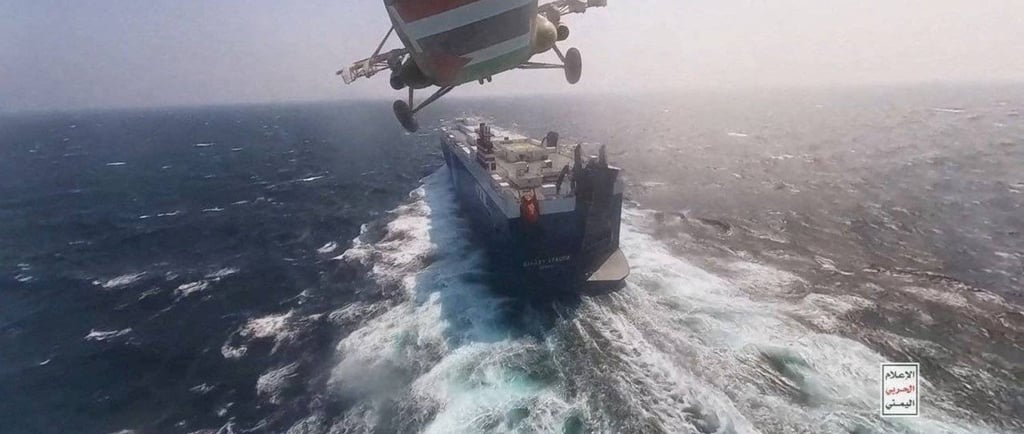Houthi Attacks on the Suez Canal: Rising Tensions, Economic Risks, and Global Trade Disruptions
The recent escalation of Houthi attacks has caused a significant reduction in traffic through the Suez Canal, threatening global trade routes and increasing operational costs. Can the global maritime industry adapt to these disruptions, or will the ongoing conflict lead to a long-term reconfiguration of trade patterns?
YEMEN
Ekaterina Romanenko
8/2/20244 min read


The Suez Canal, a crucial maritime artery connecting Europe and Asia, has recently experienced a significant drop in traffic due to escalating Houthi attacks. According to the United Nations Conference on Trade and Development (UNCTAD), these assaults have reduced canal traffic by 42%, heightening tensions in the Red Sea and increasing risks for businesses.
The ongoing conflict in Gaza has intensified, with Yemeni Houthis nearly blocking the Suez Canal through frequent attacks on Israel-linked ships. Mohammed al-Bukhaiti, a senior Houthi official, stated that the attacks will continue until “crimes in Gaza stop and food, medicines, and fuel are allowed to reach its besieged population.”
The conflict in Gaza escalated when the Palestinian militant group Hamas launched an assault on Israel on October 7, resulting in the deaths of 1,200 people according to Israeli sources. Israel responded with a military campaign, which, according to medical officials in Gaza, has killed over 34,000 Palestinians. The Houthis have used this situation to launch attacks on maritime targets in the Red Sea, disrupting traffic in the Suez Canal.
The Suez Canal generated approximately $6.3 billion in revenue annually before the crisis. This vital link significantly reduces travel distances and costs, enhancing trade efficiency. However, recent disruptions have jeopardized its role, threatening to reroute global trade patterns significantly.
According to a report published by the U.S. Defense Intelligence Agency in June 2024, Houthi attacks in the Red Sea have affected the interests of 65 countries and 29 major energy and shipping firms.
Houthi attacks have created a perilous environment, forcing companies to seek alternative routes, such as the Cape of Good Hope. While a necessary security measure, rerouting ships has substantial economic implications. The additional distance adds approximately 12 to 15 days to voyages, increasing fuel consumption and operational costs: "Alternate shipping routes around Africa add about 11,000 nautical miles, 1-2 weeks of transit time, and approximately $1 million in fuel costs for each voyage," the DIA report says.
Egypt, which owns the Suez Canal, has faced severe economic consequences from reduced canal traffic. As highlighted by the Atlantic Council, the loss of revenue from the Suez Canal has exacerbated the country's fragile economy. In 2023, the canal generated about $7 billion, constituting around 2% of Egypt's GDP. This revenue has plummeted by nearly half due to the Red Sea crisis.
European businesses have also faced increased costs due to longer shipping routes and potential delays. According to a report by the European Parliament, rerouting around the Cape of Good Hope has added billions to annual transportation costs, affecting industries reliant on timely deliveries of raw materials and finished goods. Politico reports that European supply chains are under severe strain, with a potential 20% increase in shipping costs.
However, not all businesses have suffered losses. The attacks have financially transformed the struggling Israeli shipping company Zim, turning it into a "money-making machine" after rival liner operators stopped calling at Israeli ports.
After the Gaza war began, the Haifa-based shipping company Zim, which had been operating at a loss in November 2023, saw its stock double by January of the following year. The decision by the Chinese operator Cosco Shipping Lines to cease calls at Israeli ports led to Zim receiving more requests from Israeli shippers wanting to send their goods.
While Israel, which relies more on the Mediterranean Sea than the Red Sea, has shown resilience, experts warn that the attacks already pose a threat to Israel's economy and could cause more significant damage if they continue. Major global shipping companies, such as Evergreen and Maersk, have already rerouted their vessels to avoid the conflict zone, leading to longer transit times and higher fuel costs.
The main Israeli ally USA has condemned the Houthi attacks in the Red Sea, viewing them as significant threats to global trade and regional stability. Secretary of State Antony Blinken stated, "…ongoing attacks by the Houthis on maritime navigation… pose an unacceptable threat to international trade, regional security, and other national interests." The Biden administration has taken a firm stance, designating the Houthi financial network to cut off their funding sources in coordination with Gulf partners.
While the U.S. Department of State says it "remains firmly committed to helping Saudi Arabia and the UAE defend themselves against these Houthi attacks," an Atlantic Council analysis shows that Egypt's control over the Suez Canal is crucial for ensuring the secure passage of global maritime traffic. Additionally, Saudi Arabia and the UAE's military capabilities are essential for countering Houthi aggression and enhancing regional security.
In any case, the potential for further escalation of the conflict poses significant risks. UNCTAD warns that unprecedented shipping disruptions raise the risk of global trade setbacks, potentially destabilizing international markets and supply chains. Businesses must brace for increased costs and uncertainties, which could affect production schedules and profitability.
However, there are also potential benefits. For instance, businesses that can navigate these challenges may find new opportunities in logistics and security services. The increased demand for alternative shipping routes could benefit ports and shipping companies that offer reliable alternatives to the Suez Canal. For Israeli businesses, particularly in the shipping sector, there may be opportunities to capitalize on enhanced security measures and strategic rerouting to maintain their market share. Egyptian businesses could leverage international support and investments aimed at stabilizing and securing the Suez Canal. European and Asian businesses may find opportunities in developing more resilient supply chains and diversifying their logistical networks.


